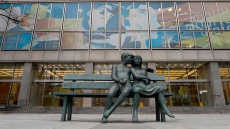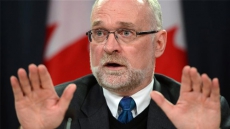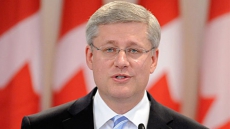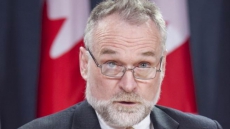VANCOUVER — Half of British Columbia has been designated an avian flu control zone in an effort to limit the spread of the virus and reassure other countries that Canadian commercial poultry is safe.
The restrictions, imposed by the Canadian Food Inspection Agency, become increasingly strict the closer producers are to the five farms that tested positive for the highly virulent strain of avian flu.
The virus swept through three chicken and two turkey farms in the Fraser Valley. Just under 150,000 birds have either died or will be destroyed and composted on site to prevent the spread.
Dr. Harpreet Kochhar, Canada's chief veterinary officer, said the control zone are meant to reassure the international community, especially countries that have temporarily banned poultry products from Canada.
"Those who have put some restrictions on all of Canada will start to look at reducing that to only British Columbia or the Fraser Valley," he told reporters Monday in a conference call.
The zone boundaries are the Pacific Ocean on the west, the U.S. border to the south, the B.C.-Alberta boundary, and Highway 16, which intersects the province at Prince George.
Mike Dungate, executive director of the Chicken Farmers of Canada, said producers have been pushing for a larger control area.
"Because we lived through this in 2004," he said. "In 2004, they made the control area too small at the start and had to enlarge it."
A decade ago, a highly pathogenic strain of H7N3 avian flu swept through commercial farms and backyard coups in the Fraser Valley, resulting in the destruction of 17 million birds.
The latest flu has prompted the United States, Mexico, South Africa and several Asian countries to impose a variety of trade restrictions on poultry from either Canada, British Columbia or the Fraser Valley.
About seven per cent of Canada's chickens are exported to countries such as the United States, Taiwan and the Philippines.
Dungate said the control area is an effort to persuade countries to reconsider stopping exports from other provinces.
"Yes, it does cause an issue for us in B.C. We like it that they maintain it in B.C., because last time, everybody immediately said all of Canada (will be restricted) and that caused problems where it didn't need to cause problems."
The CFIA has cautioned that the virus does not pose a risk to consumers if poultry meat is properly handled and cooked, though in rare cases it can be transmitted to people who work in close contact with the animals.
The control area is divided into three zones representing risk: infected, restricted and security.
An infected zone is a three-kilometre ring around an infected farm, a restricted zone sets up a 10-kilometre area around the farms and the security zone is the remainder of the control zone.
Kochhar said farmers will have to follow regulations on captive birds, poultry products or byproducts and anything that has been exposed to the birds including feed, vehicles, equipment and clothing.
Farmers will need to provide a permit to ensure their birds are free from the avian flu before they can be sent to a processing facility, he said.
Michel Benoit, general manager of B.C. Turkey Farmers, said about 25,000 turkeys meant for Christmas have been lost because of the avian flu sweeping through two farms.
He said that represents a small percentage of the 3.3 million kilos of turkey that B.C. residents consume at Christmas.
"The processors are working right now with other provinces to see if we can get that need filled. We're optimistic that shortage will be filled by product coming from Alberta, maybe as far as Manitoba."
Benoit is hopeful the flu will be contained quickly and CFIA officials find the cause soon.
"At this point it's still a jigsaw puzzle. You don't have the picture and you're trying to make the jigsaw puzzle without the picture to look at and trying to put it together," he said. "One day, once we get it, we'll say of course we should have seen it from the beginning."





